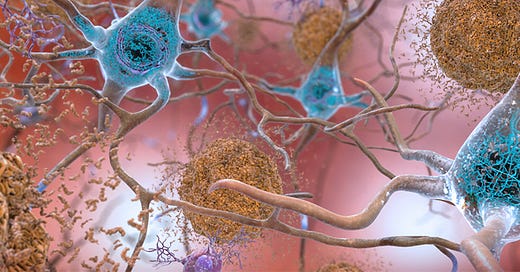We hope you got your beauty sleep last night, because today we’re talking about a new study that details the long term risks of getting less than 6 hours of sleep a night. Alternative study title: Turns Out Your Mom Is In Fact Always Correct. Read on to find out more.
Today’s Pulse is 800 words, or a 6 minute read.
If you like what you read, make sure to drag the email to your “primary” tab!
STUDY RESULTSMaybe hit that snooze button a few more times…
The pulse:
A study published in Nature this week found that middle aged adults who sleep six hours or less per night have a 30% higher risk of dementia than do middle aged adults who sleep seven hours nightly.
How was the study conducted?
Researchers followed about 8,000 people in Britain for 25 years between 1985 and 2016, beginning at age 50. During this study period, participants were periodically asked to fill out questionnaires about their sleep patterns, including how many hours of sleep they averaged on weeknights. Importantly, the study did not account for quality of sleep, often measured by factors such as sleep latency (amount of time it takes to fall asleep), awakenings during the night, and fatigue during the day.
The study investigators then tracked which patients developed dementia by the end of the study. Of the 7,959 participants, 521 people had been diagnosed with dementia by 2016 at an average age of 77.
What was the purpose of the study?
The relationship between sleep disturbances and dementia has been difficult to elucidate. It’s known that patients with dementia often have difficulty sleeping. For example, people with Alzheimer’s wake up more frequently and stay awake longer at night than people without Alzheimer’s. However, it’s unclear whether dementia is the cause of troubled sleep or whether troubled sleep could potentially be a risk factor for dementia. According to Erik Musiek, a neurologist and co-director of the Center on Biological Rhythms and Sleep at Washington University in St. Louis, the murky relationship has posed a “chicken or egg question of which comes first, the sleep problem or the pathology.”
The strength of this new study comes from its longitudinal timeframe. Changes in the brain often begin 15-20 years before patients start to show symptoms of dementia, such as forgetfulness or memory loss. The study started following these patients at age 50, (27 years before the average age of diagnosis of dementia in this cohort) an age that likely preceded dementia associated brain changes. The key word is likely — there’s no way to prove for sure that the 521 patients ultimately diagnosed with dementia didn’t already have changes neural pathology at the start of the study. Still, according to Dr. Musiek, “There’s a decent chance that they are capturing people in middle age before they have Alzheimer’s disease pathology or plaques and tangles in their brain.”
Couldn’t there be other factors at play here that increase the risk of dementia?
Ah, you’re talking about confounders (something other than the variable being studied that could explain a study’s results). For example, let’s say people who sleep less are also less physically active. How would we know whether it’s less sleep or less activity that’s associated with increased risk of dementia? To control for confounders, the study team adjusted for various health related and sociodemographic factors that could possibly skew results. This included physical activity, smoking, alcohol, body mass index, diet, education level, marital status, depression, hypertension, diabetes, and cardiovascular disease. Even with these adjustments, persistent “short sleep” (defined as six or less hours) at age 50, 60, and 70 was associated with a 30% increased risk of dementia.
Amyloid plaques at the center of the “amyloid hypothesis”. Source: Medpage
Why might sleep in middle age affect your risk of dementia in old age?
One theory is that when we sleep, our bodies are able to clear a protein called amyloid from our brains. Amyloid is a protein that can clump into plaques that are highly implicated in the development of dementia. If you believe the amyloid hypothesis — disclaimer, not all scientists do — then you believe that these amyloid plaques are one of the main drivers of Alzheimer’s disease and neuronal toxicity. Studies have shown that when people are sleep-deprived, levels of amyloid in their cerebrospinal fluid go up. Some scientists believe sleep is important for clearing a number of proteins from the brain, not just amyloid. Another theory is that the longer we stay awake, the more amyloid we actually produce which may contribute to the risk of dementia. The truth is, no one really knows just yet and there’s a lot more work to be done in this arena.
Okay, so what about for those of us under age 50?
The jury is still out on that — the trial did not look at the sleep of younger adults. While this study has been pivotal for its 25 year follow-up, unfortunately it doesn’t allow us to say much about lost sleep in our 20s. In the meantime, we’ll be patiently waiting for a trial with a 50-year follow up.
Bottom line it for me:
A new long term study suggests that persistent short sleep in middle age heightens the risk of developing dementia in old age by about 30%. Though scientists are not yet entirely sure why, it probably couldn’t hurt to move your bedtime up an hour.





